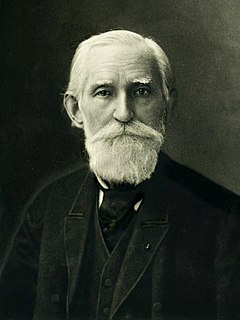
Back بافنوتي تشيبيشيف Arabic بافنوتى تشيبيشيف ARZ Pafnuti Çebışev Azerbaijani پافنوتی چبیشف AZB Пафнуцій Львовіч Чабышоў Byelorussian পাফনুতি লভোভিচ চেবিশেভ Bengali/Bangla Pafnuti Txebixov Catalan Pafnutij Lvovič Čebyšev Czech Pafnuti Lwowitsch Tschebyschow German Παφνούτι Τσεμπισιόφ Greek
Pafnuty Chebyshev | |
|---|---|
 Pafnuty Lvovich Chebyshev | |
| Born | 16 May 1821[1] |
| Died | 8 December 1894 (aged 73)[1] |
| Nationality | Russian |
| Other names | Chebysheff, Chebyshov, Tschebyscheff, Tschebycheff, Tchebycheff |
| Alma mater | Moscow University |
| Known for | Work on probability, statistics, mechanics, analytical geometry and number theory |
| Awards | Demidov Prize (1849) |
| Scientific career | |
| Fields | Mathematician |
| Institutions | St. Petersburg University |
| Academic advisors | Nikolai Brashman |
| Notable students | Dmitry Grave Aleksandr Korkin Aleksandr Lyapunov Andrey Markov Vladimir Andreevich Markov Konstantin Posse Yegor Ivanovich Zolotarev |
| Signature | |
Pafnuty Lvovich Chebyshev (Russian: Пафну́тий Льво́вич Чебышёв, IPA: [pɐfˈnutʲɪj ˈlʲvovʲɪtɕ tɕɪbɨˈʂof]) (16 May [O.S. 4 May] 1821 – 8 December [O.S. 26 November] 1894)[3] was a Russian mathematician and considered to be the founding father of Russian mathematics.
Chebyshev is known for his fundamental contributions to the fields of probability, statistics, mechanics, and number theory. A number of important mathematical concepts are named after him, including the Chebyshev inequality (which can be used to prove the weak law of large numbers), the Bertrand–Chebyshev theorem, Chebyshev polynomials, Chebyshev linkage, and Chebyshev bias.
- ^ a b c d Pafnuty Chebyshev. Encyclopaedia Britannica
- ^ "Pafnuty Lvovich Chebyshev". MacTutor. Retrieved 22 November 2024.
- ^ Pafnuty Lvovich Chebyshev – Britannica Online Encyclopedia